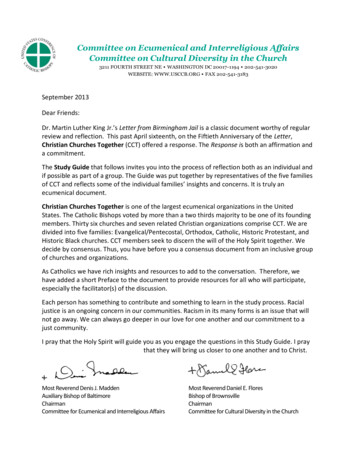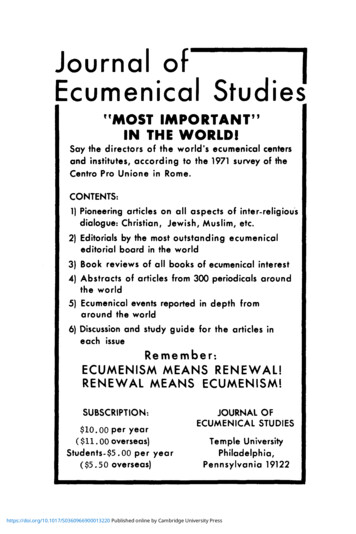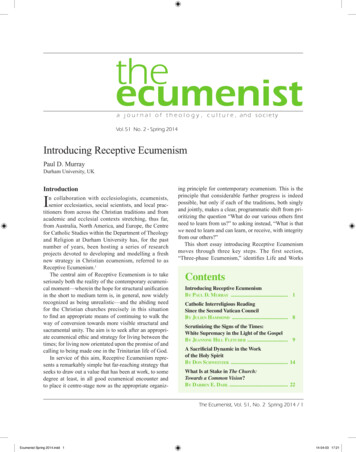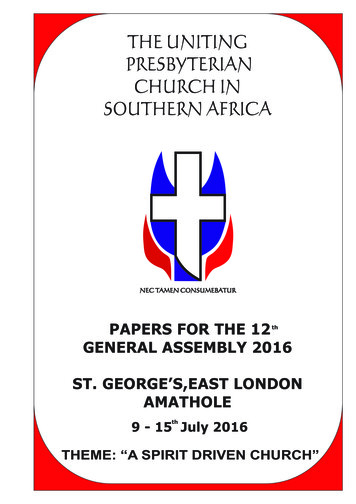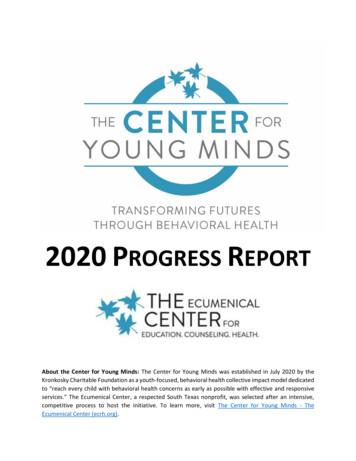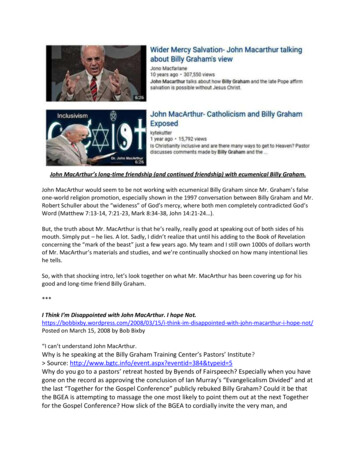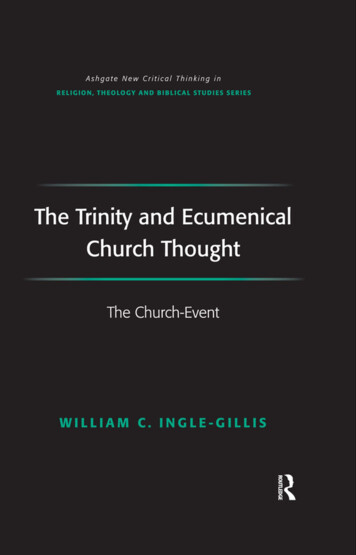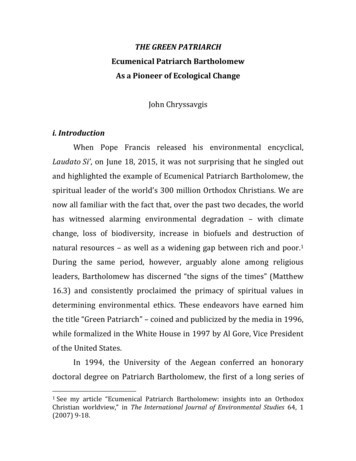
Transcription
THE GREEN PATRIARCHEcumenical Patriarch BartholomewAs a Pioneer of Ecological ChangeJohn Chryssavgisi. IntroductionWhen Pope Francis released his environmental encyclical,Laudato Si’, on June 18, 2015, it was not surprising that he singled outand highlighted the example of Ecumenical Patriarch Bartholomew, thespiritual leader of the world’s 300 million Orthodox Christians. We arenow all familiar with the fact that, over the past two decades, the worldhas witnessed alarming environmental degradation – with climatechange, loss of biodiversity, increase in biofuels and destruction ofnatural resources – as well as a widening gap between rich and poor.1During the same period, however, arguably alone among religiousleaders, Bartholomew has discerned “the signs of the times” (Matthew16.3) and consistently proclaimed the primacy of spiritual values indetermining environmental ethics. These endeavors have earned himthe title “Green Patriarch” – coined and publicized by the media in 1996,while formalized in the White House in 1997 by Al Gore, Vice Presidentof the United States.In 1994, the University of the Aegean conferred an honorarydoctoral degree on Patriarch Bartholomew, the first of a long series ofSee my article “Ecumenical Patriarch Bartholomew: insights into an OrthodoxChristian worldview,” in The International Journal of Environmental Studies 64, 1(2007) 9-18.1
2awards and honorary degrees presented to the Patriarch in recognitionof his efforts and initiatives for the environment, including the firstinternational Visionary Award for Environmental Achievement from theNew York-based organization Scenic Hudson in 2000 and the SophiePrize of Norway in 2002. In 2008, Ecumenical Patriarch Bartholomewwas named one of Time Magazine’s 100 Most Influential People in theWorld for “defining environmentalism as a spiritual responsibility.”ii. Initiatives and Activities; Seminars and SymposiaThe environmental initiatives of the Orthodox Church date to themid-1980s. At a Pan-Orthodox Conference in Geneva (1986),representatives voiced concern about pollution; the emphasis was onleaving behind a better world. Several Inter-Orthodox consultationsfollowed, one on the island of Patmos (1988) to mark the 1900thanniversary since the writing of the Book of Revelation; delegates thererecommended that the Ecumenical Patriarchate designate a day ofprayer for the environment.The following year, Ecumenical Patriarch Demetrios published thefirst encyclical letter on the environment, proclaiming September 1st –the beginning of the church year – as a day for all Orthodox Christians topray for God’s creation. Since 1989, an encyclical is published annually,while the church’s foremost hymnographer, Monk Gerasimos, wascommissioned to compose a special prayer service for the environment.Just one month after his election in 1991, Patriarch Bartholomeworganized an environmental gathering in Crete, forging a close bondwith the World Wildlife Fund and its international chairman, the Duke
3of Edinburgh.2 A month later, he convened an unprecedented meeting ofall Orthodox Primates, the first of six to date and an historicalexpression of unity, inviting Orthodox leaders to inform congregationsabout the urgency of global warming. During that meeting, all OrthodoxHeads embraced the recommendation of Bartholomew to observeSeptember 1st as a day of prayer for the environment – a commitmentsubsequently accepted by other Christian organizations (including theWorld Council of Churches and the Conference of European Churches).3In 1994, a seminar was held at the Theological School of Halki, the firstof five successive annual summer seminars, hitherto unparalleled in theOrthodox world, to consider the ecological dimensions of ReligiousEducation, Ethics, Communications, Justice, and Poverty.Convinced that any response to climate change involve dialoguewith every Christian confession, religious faith and scientific discipline,in 1994 the Patriarch created the Religious and Scientific Committee(RSE). Chaired by distinguished theologian Metropolitan John[Zizioulas] of Pergamon,4 RSE hosted eight symposia from 1995 to 2009– under the joint auspices of the European Commission or the UnitedNations – to reflect on our planet's waters. These sea-borne symposiaassembled in the Mediterranean and Black Seas, on the Danube andEcumenical Patriarchate assisted by the World Wide Fund for Nature, Orthodoxyand the Ecological Crisis, Helsinki: WWF International, 1990. See also EcumenicalPatriarchate assisted by Syndesmos, So That God’s Creation Might Live: The OrthodoxChurch Responds to the Ecological Crisis. Proceedings of the Inter-OrthodoxConference on Environmental Protection, Crete, 1991.3 In 2015 (!), the Orthodox Church of Russia – perhaps reluctantly – announced thatit, too, would join in such prayer for the environment, albeit on the first Sunday afterSeptember 1st.4 See a series of his articles, entitled “Preserving God’s creation: three lectures ontheology and ecology,” King’s Theological Review XII, 1989.2
4Amazon Rivers, on the Adriatic and Baltic Seas, in the Arctic Ocean andalong the Mississippi River.iii. Another Worldview; A Different VisionThe way we view our planet reflects how we relate to it. We treatour planet in a godless manner precisely because we perceive it as “godforsaken.” Unless we change the way we see the world, then we shallsimply be dealing with symptoms, not their causes. Ultimately, then, ourstruggle against climate change is a battle over how we imagine ourworld; it is a crisis of differing – even conflicting – worldviews.5In his now classic article, “The Historical Roots of our EcologicalCrisis,” medieval historian Lynn White, Jr. (1907-1987), alreadysuspected this truth – although neither he nor subsequent scholarselaborated on it:The Greek saint [he wrote] contemplates; the Western saintacts. The implications of Christianity for the conquest ofnature would emerge more easily in the Westernatmosphere.6For representative works by Orthodox theologians, see P. Sherrard, 1987, TheEclipse of Man and Nature: An Enquiry into the Origins and Consequences of ModernScience, Felton, Northumberland: Lindisfarne Press, 1987; P. Sherrard, HumanImage, World Image, Ipswich: Golgonooza Press, 1990; Metropolitan Kallistos[Ware] of Diokleia, Through the Creation to the Creator, Friends of the CentrePapers, 1997; Metropolitan Paulos Gregorios, 1978, The Human Presence: AnOrthodox View of Nature, Geneva: World Council of Churches, 1978 (later publishedas The Human Presence: Ecological Spirituality and the Age of the Spirit, 1987). Seealso John Chryssavgis, Beyond the Shattered Image: Orthodox Insights into theEnvironment, Minneapolis, MN: Light and Life, 1999.6 Science 155, March 1967, 1203-1207.5
5Often, we are convinced that solving the ecological crisis is a matter ofacting differently, more effectively, more sustainably. Let’s not forget,however, that it is our very actions that led us in the first place to themess we’re in. Paradoxically, ecological correction may in fact beginwith environmental in-action, with proper vision and awareness.For Patriarch Bartholomew, it is a matter of truthfulness to Godand honesty with the world. This is why he condemns environmentalabuse as a sin!7 Only a radical reversal of our values and ways – what anearly Apostolic text calls “a great understanding” – can provide anysolution to the impasse. The environment is not only a political or atechnological issue; it is, as the Patriarch underlines, primarily areligious and spiritual issue. In nature, survival and salvation coincide.Martin Parry, former co-chair of the IPCC, once observed: “We areall used to talking about these impacts coming in the lifetimes of ourchildren and grandchildren. Now we know that it’s us.”8 So the problemlies in how we define reality: physics and chemistry demand radical cutsin carbon emissions; political realism tells us to advance slowly. In thisbattle, there is only one choice: economic tax codes and legislativeregulations can be amended; the laws of nature cannot. Seeing clearlyand candidly is the only way of countering political denial. The race isdesperate. Politics is chasing reality, and the distance between themisn’t closing nearly fast enough.See John Chryssavgis, On Earth as in Heaven: Ecological Vision and Initiatives ofEcumenical Patriarch Bartholomew, New York, NY: Fordham University Press, 2012.8 See M. Parry (et al.), Climate Change 2007: Impacts, Adaptation and Vulnerability.Contribution of Working Group II to the Fourth IPCC Assessment. Cambridge UK:Cambridge University Press, 2007, 990 pages.7
6iv. The Role of Religion; The Way ForwardIt will take no less than a high-profile crusade by religious andcivic leaders to force change among our political leaders, a movement ascritically urgent and as morally imperative as any campaign forfundamental human and civil rights. Such a movement demands globalinvolvement and personal sacrifice. We all need to see the worlddifferently, to learn to change our habits – from what we want to whatthe world needs.It is not just a matter of pursuing alternatives, whether political(like cap-and-trade) or personal (like carbon offsets). These solutionsresemble medieval “indulgences,” resulting neither in a radical responseto the challenge at hand nor in any substantial change of lifestyle. Theyjust create a sense of self-complacency, ultimately promoting only asense of self-sufficiency.And here lies the heart of the problem. For we are unwilling toadopt simpler lives. If we are guilty of relentless waste in our world, itmay be because we have lost the spirituality of simplicity and frugality.The challenge is: How do I live in such a way that promotes harmony –not division? How do I live in such a way that communicates gratitudeor generosity – not greed or arrogance?And when we begin to understand that climate change is not justone in a long list of problems confronting politicians, then we gain newinsight, a new lens through which to perceive our world. Through thisperspective, foreign policy looks very different; threats to security canbe met by shipping technology to China, rather than by shippingweapons to China’s enemies. Through this lens, the economy too
7appears radically different; we abandon the urge for unbridledexpansion and focus on the sustainability we so desperately need.Some years ago, Larry Summers (Bill Clinton’s secretary of thetreasury, a World Bank economist, and Barack Obama’s director of thenational economic council) declared he “cannot and will not accept any‘speed limit’ on American economic growth.”9 Have we become soaddicted to fantasies about riches without risk and profit without price?Religious and civic leaders must persistently remind politicalleaders that there is no way of endlessly manipulating our environmentthat comes without cost or consequence. We are – as we now know welland as mystics have taught through the ages – intimately andinextricably bound up with the history and destiny of our world.Economy and technology are toxic when divorced from ourvocation to see the world as God would see it. And if God saw the worldas “very good” on that sixth day of creation, then we too can begin tosense in our world the promise of beauty and to see the world in itsunfathomable interrelatedness. Then, we shall hear the grass grow andfeel the seal’s heart beat. To paraphrase the Psalmist: “All things look toGod. When God sends forth his breath, then creation happens all overagain; and the face of the earth is renewed.” (Psalm 103 [104]. 27-30)v. ConclusionWe tend to call this an ‘ecological’ crisis, which is a fair descriptionin so far as its results are manifested in the ecological sphere. Yet, theOn Larry Summers, see Richard Bradley, Harvard Rules: Lawrence Summers and theBattle for the World’s Most Powerful University, New York: Harper Collins, 2005.9
8crisis is not first of all ecological. It is a crisis concerning the way weperceive reality, the way we imagine or image our world. We treat ourplanet in an inhuman, god-forsaken manner precisely because we see itin this way, precisely because we see ourselves in this way. EcumenicalPatriarch Bartholomew offers a refreshing, alternative way of seeingourselves in relation to the natural world.As a religious leader, the Ecumenical Patriarch’s initiatives toprotect the environment are worthy of acclamation and emulation. Hisworldview, derived from the ancient values of the Orthodox ChristianChurch, deserves greater attention and application.
In 1994, the University of the Aegean conferred an honorary doctoral degree on Patriarch Bartholomew, the first of a long series of 1 See my article Ecumenical Patriarch Bartholomew: insights into an Orthodox Christian worldview, in The International Journal of Environmental Studies 64, 1 (2007) 9-18.



